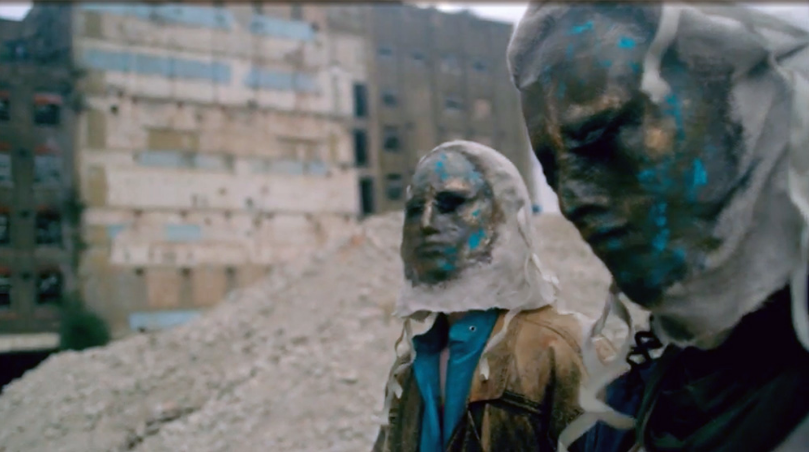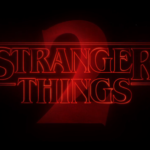
PKD’s Electric Dreams: EP 1 – The Hood Maker
 Starring: Richard Madden, Holliday Grainger, Noma Dumezweni, Anneika Rose
Starring: Richard Madden, Holliday Grainger, Noma Dumezweni, Anneika Rose
Director: Julian Jarrold
Writers: Philip K. Dick, Matthew Graham
Philip K. Dick’s Electric Dreams, a ten-part anthology, features stand-alone episodes based on the late writer’s short stories. Though there have been some big screen adaptations of his work, such as Total Recall, Minority Report, Paycheck, and of course my favorite, Blade Runner. However, very few have made it to television – Minority Report and The Man in the High Castle being recent, and lone, examples. Arguably, the merits, success (or lack of) and how true it is to the source material vary from adaptation to adaptation, but I did enjoy most of the movies.

The Hood Maker, the first episode, is set in a slightly altered future where society has ‘evolved’ beyond electronic methods of communications (a bit more on that later). There are no cells, no computers, no Internet, but, – cue drum roll – there are telepaths (referred to as Teeps)! And, with their extraordinary ability, they have cornered the market on mass communication, as they’re able to read minds and ‘talk’ across vast geographical areas, like a Google of human brains. For this reason, ‘Normals’ (those without the ability), fear them. We know that fear leads to anger, and anger leads to… well, you know how the saying goes. And the Normals hate the Teeps, who are mistreated, abused, humiliated and ostracized. And just to make it that much harder for them to avoid this treatment, they all have some kind of visible markings on their face (à la Scarlet Letter).
So, what kind of a mess is this society? Normals are protesting against Teeps. Teeps are on the verge of fighting back against the oppressors. The police force/ruling class want to quell the potentially violent protests, while also ensuring the privacy of their own thoughts. Tense, right? And, this is only the canvas for the story.

In The Hood Maker, Agent Ross (Richard Madden) gets a new partner, Honor (Holliday Grainger), a Teep, to deal with the growing societal unrest. Her help is invaluable in identifying the potentially more dangerous protesters. (SLIGHT SPOILER AHEAD) As the title of the episode implies, the story revolves around a character, known as the Hood Maker. They’ve developed a hood that allows the wearer to shield their thoughts from telepaths, a firewall of sorts, for the brain.
What did I like?
Personifying the two sides, Normals and Teeps, Madden, and especially Grainger, played their roles convincingly and displayed good on-screen chemistry given the short air time of a television episode. Though they worked together, with an apparent common goal, it was clear that neither of them fully trusted the other.
With a presumably limited budget, director Julian Jarrold managed to create a dreary, dark and claustrophobic world. The use of filters – yellows and greens – was just enough for me to sense that although this world was highly similar to my own, it wasn’t the same. The dystopian-like atmosphere supported the fact that all was not well in this reality.
I loved the ending. Admittedly it is ambiguous, but it works. I get that in some cases, you need closure at the end of a story, but life just doesn’t always provide it. It made me think about the two characters, and ultimately about the complexity of issues addressed. And that’s good storytelling.
What didn’t I like?
Although I’m easily entertained, my enjoyment was interrupted a few times by a couple of nagging thoughts. I’m all for suspending my disbelief, up to a point. First, why do the Teeps take all that abuse? They have a formidable power at their disposal – control of information gathering and mass communication – giving them a clear advantage over Normals. Why haven’t they acted? Why continue to be oppressed? I get it’s necessary for the sake of the story. If I were in that situation, I would delve in every mind possible and extract any advantage I could to change the status quo.
Second, how does it make sense that the elimination of electronic and mass communication would be a natural human evolutionary step? Only a minority have the telepathic ability, so what about the majority of the population? It’s quite the suspension of disbelief to accept we would willingly turn our backs to communicate across distances. Or to search the Internet or some other evolved form of information depository. Maybe there’s a reason but isn’t given in the episode.

Verdict: Watch It. The Hood Maker is at its surface, a buddy cop story, with a dash of sci-fi, a pinch or romance, and a little (lemon) twist at the end. But to only see that is to miss the point of the story. Simmering underneath, are issues of inequality, trust, social class structure, technology, psychological abuse, physical abuse, and abuse of power to name but a few, issues which are still topical today. Of note are the issues of information, surveillance, and privacy.
The Hood Maker highlights the intensity with which we want to protect our private information. Society is faced with those who can read your innermost private thoughts, and the state agrees that there should be limitations. Ironically, the state uses this power to root out dangerous citizens. So, where does it stop? Does anyone have the right to invade other’s private thoughts? Interesting questions brought up in 1955, but that still pervade today’s discussions about right to privacy and access to information.
When I enjoy a show, I simply look to be entertained first. And, The Hood Maker did that for me. It is a simple story with complex undertones. Even with the suspension of disbelief issues, this is a should watch.

![[REVIEW] ‘LUCIFER SEASON 4’ RETURNS TO ITS ROOTS IN SEASON 4](https://geekd-out.com/wp-content/uploads/2019/05/Lucifer-S4-150x150.jpg)

